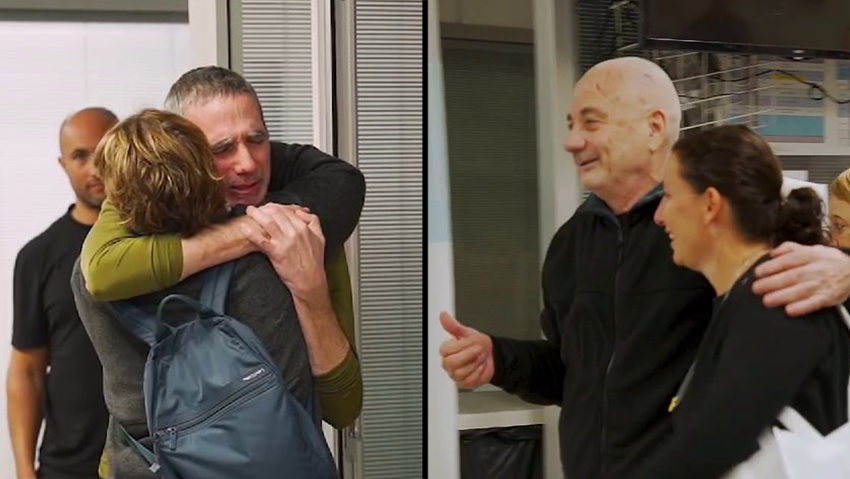Fernando Marman and Luis Har were rescued from Hamas captivity in Rafah after 129 days in captivity, during which they lost a lot of weight. Family members of the two men said that they ate mostly pita bread and white cheese while in captivity, adding that "for days they were hungry."
More stories:
Two clinical dietitians spoke to Ynet about how such a sharp weight loss affects the human body, what are the associated dangers, what effects the monotonous diet has and how it is possible to return to normal after more than four months of malnutrition.
3 View gallery


Fernando Maram and Luis Har greet family members at Sheba Hospital
(Photo: IDF Spokesperson's Unit)
These testimonies regarding the starving of the hostages join those that were already heard about two and a half months ago in an internal discussion of the Health Ministry regarding the situation of the hostages who returned to Israel. During the same discussion, alarming data was revealed which showed that elderly women who were kidnapped to the Gaza Strip and returned to Israel in the first two rounds of the hostage deal lost an average of 8 to 15 kilograms of their weight in less than two months of captivity.
Fernando Marman's niece, Gefen Sigal Ilan, told Ynet that "they came back pale and thin. They both really like good food, so little by little they will return to enjoying it." Idan Bejerano, Luis' son-in-law said the two are already planning to throw some meat on the coals as Argentinians do.
"First of all, this is involuntary weight loss, and it is always much more serious than voluntary weight loss," explained Sharon Tiberg, director of the general clinical nutrition unit in the Sharon-Shomron district of Clalit Health Services. "The first thing that is damaged is the muscle mass, which is the one that is supposed to hold up the body. Only after that do the fat stores that the body uses begin to be damaged."
Tiberg added that the fact that the hostages did not exercise for more than four months leads to a more significant muscle breakdown that causes weakness and may even damage the heart, lungs and respiratory tract. "In addition, they hardly ate protein and there was nothing that would preserve the muscle mass, they did not eat fruits and vegetables and did not receive important vitamins and minerals," she said.
Regarding refeeding after release from captivity, Tiberg clarified that "returned people dream about the food they want to eat and it is a problem to prevent them - but it is important for their health."
3 View gallery


Sharon Tiberg, director of the general clinical nutrition unit in the Sharon-Shomron district of Clalit Health Services
(Photo: Studio Laurit)
"As soon as the body does not receive proper nutrition for such a long time, it begins to use energy sources of protein or fat. In such a situation, when you go back to eating food that consists mostly of carbohydrates, the whole body changes and this may cause a decrease in phosphorus, potassium, magnesium and vitamin B1. Which in extreme cases can even lead to death," she said.
"When the hostages arrive, there is a protocol for returning them to the feed to prevent such cases," Tiberg said. "There is the refeeding syndrome that is known from the liberated people of World War II. People were released from camps and died after receiving chocolate because of this syndrome. Here there are people who have not eaten properly for more than four months, so this syndrome puts them at risk and they need to be re-fed very carefully and make sure that they do not have a problem. That is why there is an orderly protocol of the Health Ministry, with a recommended menu that will allow a gradual return."
'Decreased function until heart damage'
Oriya Peres, a clinical dietitian from the central district of Clalit Health Services, added that "the patients were in captivity for a long time and experienced an unusual disorder in their diet, which led to deficiencies in vitamins and minerals that are essential for the body. As soon as there is a drastic weight loss, especially in a short period of time, the muscle is the first thing that the body breaks down for its needs." According to Peres, "being under stress for a long time also greatly affects the muscle system found in all our organs, including the heart muscle."
"In addition, there is also a decrease in cardiopulmonary function, and may reach a situation where the heart works less well and some people report shortness of breath," Peres added. "We get a total of problems that all eventually cause a decrease in function. The patients will often be tired and weaker, and will need very, very precise nutrition."
Regarding nutrition after returning from captivity, Peres clarified that "the digestive system reacts quickly to the fact that the body has not eaten a certain food for a long time. For example, if you do not eat fiber, it is difficult for the body to consume such food later. The same is true with regard to vegetables; returning to a diet of vegetables can greatly burden digestion after a long time and cause severe stomach pains."
Peres said that she had heard that the released hostages were waiting to eat meat again, but emphasized that "after more than four months, the body will not be able to deal with it successfully. It is important to return gradually, starting with easy-to-digest textures and progressing slowly."
3 View gallery


Oriya Peres, a clinical dietitian from the central district of Clalit Health Services
(Photo: Private album)
She added "I believe that they had no nutritional stability. Occasionally they only ate pita and sometimes there was nothing or there was only onion or cucumber, and you can see it in their photos as well - they experienced a decrease in the fat mass in the face."
"They went through a very, very challenging period and the return should be very, very slow but at the same time also rich. They should be fed food with a lot of calories and protein but easy to digest," according to Peres. "The first two weeks are adaptive. Start slowly alongside blood tests and start increasing the amount of calories in a rich diet with lots of protein that will allow the body to rebuild the muscle mass lost in captivity."
Peres emphasized that the mental issue must be taken into account, and noted that "it is a very, very traumatic component. The hostages may say that it is difficult for them to swallow food and this stems from a mental difficulty. Trauma is a component of this and it should be given space." According to her, 'treatment is not for the dietitian alone, but something multi-professional, with mental health professionals to help them deal with the emotional difficulty. We see people who vomit or have diarrhea following anxiety attacks, and we know that the mind affects the digestive system. They can also have an extreme lack of appetite and progress should be in accordance with the person's mental capabilities."


